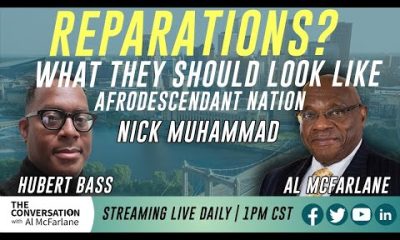#NNPA BlackPress
Jet Lag and a Crash Course on Kampala
THE AFRO — Uganda’s proximity to its large neighbor to the west, the Democratic Republic of the Congo is probably the root of its cozy commerce relationship with Belgium. The history of the Congo is tightly bound to the brutal colonization by Belgium over the country once known as the Congo Free State (later the Belgian Congo). The title, “Congo Free State” is indicative of the genocidal rule of the diabolical King Leopold II of Belgium, who essentially claimed the Congo as his own personal property (it was the world’s only private colony). In 1870, during Europe’s so-called “Scramble for Africa,” more than 80 percent of Sub-Saharan Africa was under the rule of chiefs or kings. Forty years later, by the early 1900’s virtually all of Africa south of the Sahara had been subdued by Europe. Leopold’s conquest of the Congo was the most murderous.
By Sean Yoes
Traveling for the first time to the first continent was physically brutal. Operating on virtually no sleep, I felt almost every one of the nearly 9,000 miles from West Baltimore to East Africa.
Fatigue fell upon me like a brick house, particularly, during the final long stretch of the journey, from Brussels, Belgium to Entebbe, Uganda.
As I flew from Chicago to Brussels, I wondered why this was the European layover city (via United Airlines) into East Africa. Once I arrived in Brussels, I realized it was a well established air route from this tiny European country into Uganda. But, why? What was the relationship?
Then it hit me, probably during the midnight run from Entebbe to Kampala.
Uganda’s proximity to its large neighbor to the west, the Democratic Republic of the Congo is probably the root of its cozy commerce relationship with Belgium. The history of the Congo is tightly bound to the brutal colonization by Belgium over the country once known as the Congo Free State (later the Belgian Congo). The title, “Congo Free State” is indicative of the genocidal rule of the diabolical King Leopold II of Belgium, who essentially claimed the Congo as his own personal property (it was the world’s only private colony). In 1870, during Europe’s so-called “Scramble for Africa,” more than 80 percent of Sub-Saharan Africa was under the rule of chiefs or kings. Forty years later, by the early 1900’s virtually all of Africa south of the Sahara had been subdued by Europe. Leopold’s conquest of the Congo was the most murderous.
Under his greed fueled reign in pursuit of lucrative ivory and then the rubber plant, the Congo’s indigenous population was cut in half, approximately from 20 million to 10 million from 1880 to 1920. Leopold was responsible for the death of millions of Black Africans and the maiming and forced relocation of millions more.
Context and history are foundational in the story of Africa; there was no African nation uninterrupted by European colonization. Uganda is no different, yet it endures and compared to most countries on the Continent, thrives.
“Economic growth in East Africa is soaring ahead of other regions on the continent at close to seven percent while the overall outlook for the rest of Africa is cautious, but positive. Job creation and ramping up manufacturing will continue to be, major priority for creating growth and employment across the continent,” according to a report published by the African Development Bank in April.
On the streets of Kampala the people yearn to be fully participant in the economic growth of East Africa.
The Boda Boda Brigades is what I call the legions of young men transporting passengers for money on zippy motorbikes (Boda Boda) that dominate Kampala roads. These young entrepreneurs carry one, two, sometimes three passengers on their bikes at a time.
Now, if dirt bikes were legal on the streets of Baltimore, I bet you we would have the Baltimore Boda Boda Brigades. The spirit of many of the young brothers in Uganda reminds me a lot of many of the young men I encounter on the streets of my home. Honestly, I’m not sure if the Boda Boda brothers are any more reckless than the burgeoning crowd of young hustlers, gentrifiers and hipsters whipping around Baltimore on rented scooters.
Like Baltimore, Kampala certainly has a large swath of her population grappling with poverty. As I have been driven around the bustling city for the first days of my odyssey, I’ve witnessed housing complexes that remind me of the projects back in Baltimore. Also like Baltimore, Kampala has a growing community of striving entrepreneurs; some are White American expatriates, but many are indigenous Black Ugandans. There is also a thriving music scene in Kampala, which is reminiscent of Baltimore’s legendary House and Club Music culture.
Like Baltimore, Kampala I’m told, is a complicated place; I’m just skimming the surface.
With all that I have seen already it is still hard for me to believe I am actually in this beautiful East African country; the air here may be the sweetest I’ve ever experienced.
And for the most part, the Ugandans I have met are just as sweet.
Sean Yoes is the AFRO’s Baltimore editor and the author of Baltimore After Freddie Gray: Real Stories From One of America’s Great Imperiled Cities.
This article originally appeared in The Afro.
#NNPA BlackPress
LIVE! — ASK ALMA — TUES. 5.30.23 7PM EST
This week, guest host Leah Farmer King and her panel share tips and advice to reader mail. Leah and the panel, along with the …
The post LIVE! — ASK ALMA — TUES. 5.30.23 7PM EST first appeared on BlackPressUSA.

This week, guest host Leah Farmer King and her panel share tips and advice to reader mail. Leah and the panel, along with the …
The post LIVE! — ASK ALMA — TUES. 5.30.23 7PM EST first appeared on BlackPressUSA.
#NNPA BlackPress
LIVE! — ASK ALMA! — TUES. 1.9.24 7 PM EST
HAPPY NEW YEAR! Welcome back for our first show of the year! This week, Alma and her panel answer viewer mail. As always …
The post LIVE! — ASK ALMA! — TUES. 1.9.24 7 PM EST first appeared on BlackPressUSA.

HAPPY NEW YEAR! Welcome back for our first show of the year! This week, Alma and her panel answer viewer mail. As always …
The post LIVE! — ASK ALMA! — TUES. 1.9.24 7 PM EST first appeared on BlackPressUSA.
#NNPA BlackPress
LIVE! — ASK ALMA! — TUES. 1.30.24 7PM EST
Think you’re the only one with problems? Each week, NNPA advice columnist Alma Gill, along with her panel of guest advisors …
The post LIVE! — ASK ALMA! — TUES. 1.30.24 7PM EST first appeared on BlackPressUSA.

Think you’re the only one with problems? Each week, NNPA advice columnist Alma Gill, along with her panel of guest advisors …
The post LIVE! — ASK ALMA! — TUES. 1.30.24 7PM EST first appeared on BlackPressUSA.
-

 Community3 weeks ago
Community3 weeks agoFinancial Assistance Bill for Descendants of Enslaved Persons to Help Them Purchase, Own, or Maintain a Home
-

 Business3 weeks ago
Business3 weeks agoV.P. Kamala Harris: Americans With Criminal Records Will Soon Be Eligible for SBA Loans
-

 Activism4 weeks ago
Activism4 weeks agoOakland Post: Week of April 10 – 16, 2024
-

 Community3 weeks ago
Community3 weeks agoAG Bonta Says Oakland School Leaders Should Comply with State Laws to Avoid ‘Disparate Harm’ When Closing or Merging Schools
-

 Activism2 weeks ago
Activism2 weeks agoOakland Post: Week of April 24 – 30, 2024
-

 City Government3 days ago
City Government3 days agoCourt Throws Out Law That Allowed Californians to Build Duplexes, Triplexes and RDUs on Their Properties
-

 Community2 weeks ago
Community2 weeks agoRichmond Nonprofit Helps Ex-Felons Get Back on Their Feet
-

 Community2 weeks ago
Community2 weeks agoOakland WNBA Player to be Inducted Into Hall of Fame






















































